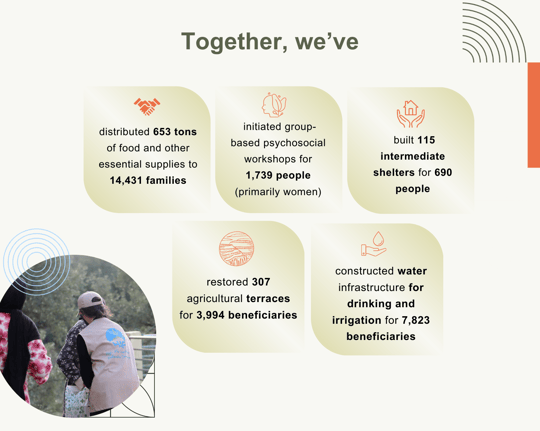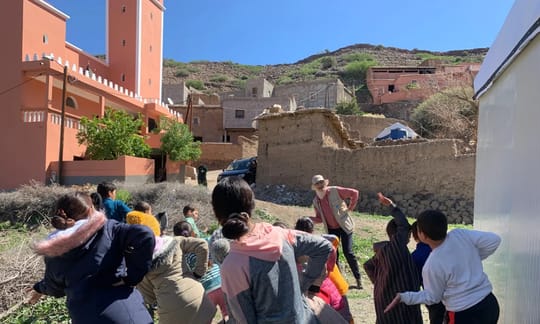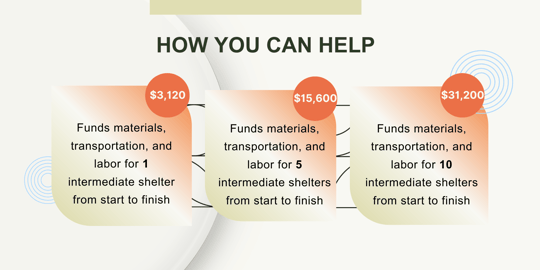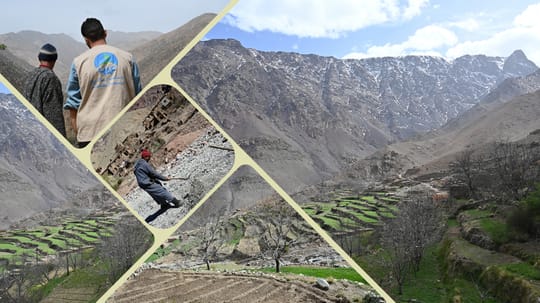Navigating Recovery Eight Months After the Earthquake

September 8 Earthquake Recovery Updates |
Dear Partners and Friends, It has been 31 years since I was a Peace Corps Volunteer, living in the High Atlas Mountains in the Toubkal municipality. I, like many in Morocco who came to sojourn for a couple of years and try to be of service, found an everlasting purpose here among the people. Morocco at all levels wants inclusive development, determined and carried by the communities who benefit from the sustainable initiatives. This principle embodies the mission of the High Atlas Foundation (HAF). When the earthquake struck on 8 September 2023, the mountain communities from where HAF emerged faced unprecedented shock, pain, and loss. We learned that our relationships decide our ability to assist recovery–our partnerships with the people and their local organizations, with government and its agencies, and with personal and institutional contributors at home and abroad. We learned that who we are at HAF, our teams, unity and systems, enabled the extent of our service. We are determined as ever to become even better. We remain today in the throes of rebuilding and delivering psychosocial support for families. Stay with us, join us anew, remain steadfast, tell others, continue the journey - and we will see in every High Atlas Mountain direction the bounty of the people’s full recovery and true prosperity - their dreams realized. We hope this Newsletter is inspiring, conveying mending after terrible loss, community project visions coming to pass following overwhelming heartbreak. We must continue and move forward together. Yours faithfully, Yossef Ben-Meir President of the High Atlas Foundation |

Nurturing Resilience: Group-based Psychosocial Empowerment

At HAF, our belief in the transformative potential of psychosocial empowerment has never been stronger. As we focus on rebuilding homes and infrastructure, we recognize the paramount importance of nurturing the human spirit. In response, we have adapted our IMAGINE participatory empowerment methodology, applied over years, to conduct a series of psychosocial workshops for the benefit of women living in the affected areas.
Three dedicated teams were formed for these psychosocial empowerment sessions, each team comprising two empowerment facilitators, a teacher, and a psychologist.
The essence of the IMAGINE methodology lies in personal discovery, which in turn leads to the identification of actions for sustainable personal and community growth. We've witnessed firsthand how affected communities found solace in the shared understanding of their pain and the collective journey towards recovery.
By fostering a sense of belonging and unity, our psychosocial support enables communities to make informed decisions about their priorities and to work together towards recovery.
Addressing the psychological impact of the earthquake is integral to our sustainable recovery efforts and an ongoing priority.
Safe Spaces For Children

The aftermath of such a disaster has left lasting scars on children, both seen and unseen. Disruption to routines and witnessing the loss of loved ones profoundly affect their mental well-being, as fear and confusion may linger long after the physical tremors have ceased.
In response, our project sought to thoughtfully create safe spaces for expression. In addition to our empowerment workshops, we’ve hired educators to help children process their emotions and regain a sense of normalcy in their lives. Through play therapy and artistic activities, they are finding creative outlets to explore their emotions and reflect upon their experiences.
Your support will directly contribute to offering a lifeline of emotional support to:

Access to Drinking Water & Rebuilding Irrigation Systems

Damages to water and irrigation systems rendered farming families, already grappling with drought and rising food prices, even more vulnerable. We’re partnering with communities in the High Atlas Mountains to build and repair water systems for drinking, irrigation, sanitation, and hygiene. The distribution of water survival boxes, water filters enables communities’ access to clean and safe drinking water, reducing the risk of waterborne illnesses and ensuring the well-being of residents.
In Al-Makayat village, Aghbar Municipality, initial consultation with the community highlighted an urgent need for the restoration of their water systems. Thanks to the support of our partners and donors, progress is evident.
Mr. Al-Arabi, depicted above, now celebrates the completion of an irrigation system in Al-Makayat village, a vital step towards revitalizing the community's livelihood. Efforts are underway to address water storage deficits, with a water tank nearing completion and plans for three additional facilities. These endeavors align with the community's aspirations to leverage these resources for tree planting initiatives, underscoring our collective commitment to sustainable recovery.
The progress in villages like El Makayat shows a targeted approach, ensuring that each area receives tailored support according to its specific needs.
Intermediate Shelters

We’ve taken a significant step forward by constructing 100 intermediate housing units in the region, with the first delivery already making an impact in Al Haouz province. In the Aghbar commune, 27 families benefited from well-insulated shelters, offering them warmth and safety until construction on permanent housing is complete. The provision of shelters not only offers a sense of comfort during a time of immense uncertainty, but also an opportunity for renewal, as Mr. Larbi, representative of the Aghbar community, expressed:
This effort does more than just offer shelter; it restores a sense of normalcy and stability, adding that “they [intermediate shelters] offer a new beginning to build our lives as we want."
Despite this progress, the challenges remain immense. Many families continue to live in makeshift tents, awaiting long-term solutions for housing. The need for intermediate housing is critical to bridge the gap between the immediate but temporary solution of tents and the eventual reconstruction of permanent homes.
Together, we can ensure that no family is left behind in their journey towards recovery

Agricultural Terraces Construction

For generations, communities in the High Atlas Mountains have practiced terrace farming, gaining greater control over water flow, soil erosion and land use. The recent damage to these agricultural terraces has disrupted local water supply and agricultural production, threatening food security and livelihoods for farming families in the region. |
In response, we’re collaborating with farmers, civil associations, and cooperatives to reconstruct and expand agricultural terraces. By the end of this project, 16 hectares of terraces (approximately 800 terraces) will be restored and operational, supporting an estimated 25,000 people in the High Atlas Mountains. |



We are grateful for each and every contribution made. From the steadfast support of our major donors and government partners to the invaluable contributions of small donors and fundraisers, each act of generosity has brought us a step closer to healing and rebuilding.
Our deepest appreciation to all those lighting the path towards community renewal and resilience:
Government Partners
|
Corporations
|
NGOs
|
4500+ Global Individual Supporters |